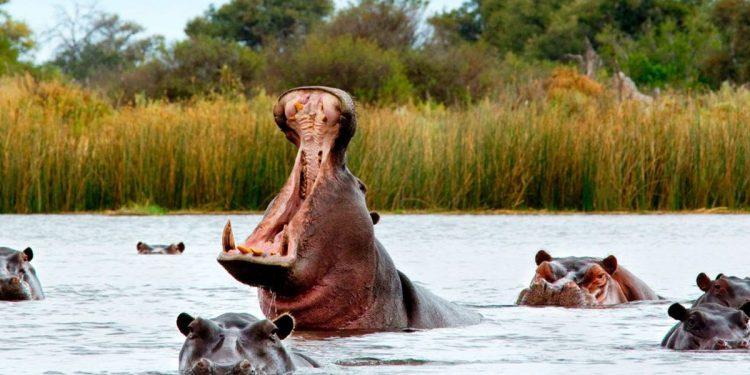Africa-Press – Botswana. A dozens of hippos trapped to death in the mud at Lake Ngami which receive water inflow from Okavango Delta is a peculiar sight in the delta which has a potential to affect the tourism.
The drying of Lake Ngami is a recurring disaster that has been linked to low rainfall from Angolan Highlands where the river originates. Similar recurring drought related to climate change crisis in the lake has be observed in Okavango delta in the past where it now threatens the lifeblood of the second largest sector of the economy.
University of Botswana, Okavango Research Institute (ORI), Professor Joseph Mbaiwa indicated that the recurring drought at Lake Ngami is a similar occurrence that has been observed in Okavango Delta. The Professor has linked the drying up of Lake Ngami which receives water from Okavango Delta to climate change. He is of the view that the drying up of the lake is influenced by low rainfall in the Angolan Highlands which indirectly results in low water entering Okavango Delta and eventually Lake Ngami.
“A recurring drought at Lake Ngami which receives water inflow from Okavango Delta affects the entire ecosystem and biodiversity and the livelihoods in the area. With soaring temperatures, erratic precipitation, droughts, flooding and many other natural factors, nature-based tourism in the Okavango Delta is highly affected,” said Prof Mbaiwa, adding that tourism has not been sparred by climate change.
Climate change is causing the shrinking of the Okavango delta and making it to shift from north to south with some of the channels either drying up or becoming seasonal. “Some parts have become dry rendering these areas unsuitable for wildlife to survive or tourism to be undertaken in these areas experts,” he said, noting that the rate at which climate change occurs in the Okavango Delta thus impedes living organisms to adapt to the changes naturally hence some species are threatened by extinction.
He noted that this shows that the vegetation and animals in the Okavango Delta are influenced by climate such as humidity, precipitation, temperature and the geomorphology. “As such, water flow as well as flora and fauna of the Okavango Delta have been altered by climate change,” added Mbaiwa, saying the effects of climate crisis also overspill to communities which live in that area.
Prof Mbaiwa said there are communities who rely on Lake Ngami for watering their livestock. “With the lake having dried, their livestock is affected hence their livelihoods are also affected. There is also Lake Ngami Trust whose main product is the selling of fish. With the lake having dried, fish is not available, and the Trust cannot make money for members or pay workers. So, there is a socio-ecological impact that has come as a result of the drying of Lake Ngami, “he added.
He said that Botswana’ is very much vulnerability to climate change and this is exacerbated by its high level of poverty and its dependence on key sectors most likely effected by climate change such as , agriculture, water, tourism, and health.
“Future projections indicate that Botswana will experience a rise in temperature as well as the increase in the frequency and intensity of extreme droughts and floods. These are likely to reduce crop yields and cause a loss in livestock, which will have important implications for food security. So, climate change is definitely causing much challenges not only to hippos but to humans as well,” said Prof Mbaiwa.
Prof Mbaiwa is hopeful that Botswana will consider research funding and the establishment of the National Research Council after COP 27 which will help guide mitigation an adaptation measures towards extreme weather events.
Ministry of Environment, Natural Resources Conservation and Tourism spokesperson, Lesego Kgomanyane could not respond to The Patriot on Sunday inquiry on adaptation measures put in place to reduce mortality of hippos and livestock caused by recurring disaster at Lake Ngami safe to say the Department of Meteorology was to respond to questions.
Source: thepatriot
For More News And Analysis About Botswana Follow Africa-Press






